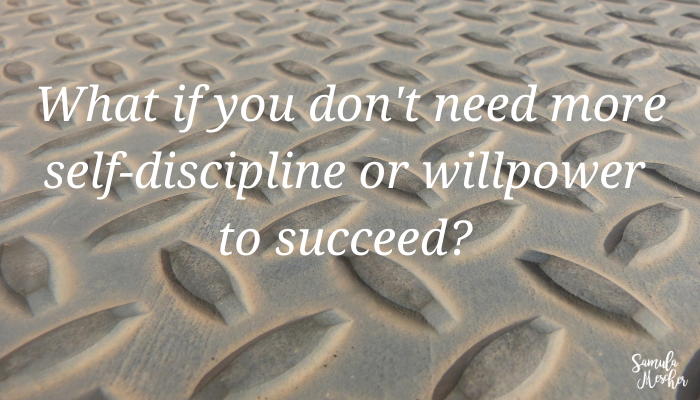
What if you don't need more self-discipline or willpower to succeed?
What if you needed more compassion and more indepth, detailed insights about yourself? Often we are very critical, harsh and disappointed with ourselves if we fail to do what we intented to do, if we fail to change a habit or form a new habit. Often our inner critic chimes in very loudly, berating us for lack of willpower, lack of self-discipline, self-control.
And you might also think that being harsh on yourself is necessary, because if you start being to nice to yourself, nothing will get done or nothing will change. Dr Kelly McGonicgal from Stanford tells us that actually the opposite is true. Research studies show that self-criticism is consistently associated with less motivation and worse self-control. While being kind and supportive to yourself, especially in the face of failure- is associated with more motivation and better self-control.
So instead of berating yourself (or others!) what can you do to increase the likelihood that you will succeed in making the change you long for?
Two steps will help you with that.
Step 1: Compassionately research your ‘failures’
Retrace your steps and kindly ask yourself: what happened love? Research what happened and what got in the way. Research the thoughts in your head, research your actions and research what you did not do or say to yourself. Also research the ‘circumstances’: what was supportive or hampering in them?
Maybe fear came up, maybe the critical voices in your head got hold of you, maybe your goal/the step you defined was just too big. Or you tried to make a change in very difficult circumstances (e.g. starting a diet the day before Christmas). Or maybe you had unrealistic expectations of what you need to succeed.
Which brings us to step 2.
Step 2: What do you need to increase the likelihood to succeed?
We often hold ourselves to some unrealistic expectation: When I decide to do it, I should just be able to start doing it and follow through with whatever I set my mind to. Let me tell you a secret: for most people this does not work - just like it most likely won’t work like this for you! So instead of berating yourself, ask yourself what do I need, what would be helpful?
Build yourself a support system based on your strengths and needs. So maybe what will help you is building in sources of accountability (no that is not weak, that is smart!) Maybe you need to spend some time to really connect to why this is important for you, maybe you need to change something in your environment to make it more supportive, maybe you first need to work on your fear and the critics in your head.
How do you respond to outer and inner expectations?
Gretchen Rubin developed framework to help you understand how you respond to inner expectations (such as a new year’s resolution) and how you respond to outer expectations, like a work deadline. Knowing your tendency can give you ideas for the supportive structure you can build for yourself to help you execute your plan or build a habit. Instead of relying on the illusive power of self-discipline. Although the framework is not scientifically validated, it immediately had intuitive appeal when I read the book “The four tendencies” a couple of years ago. It gave me a helpful lens and framework to look at myself and others I interact with.
The four tendency framework:
According to a representative sample, the distribution of the tendencies is 41% Obligers, 24% Questioners, 19% Upholders, and 17% Rebels.
Take the quiz here to see what your tendency is. (I am a Questioner by the way )
And based on your tendency different things might be helpful for you if you are trying to build a habit or make a change.
So for example:
• If you are an Upholder you want to know very clearly what should be done, want to know in advance so you can plan and you probably want to create a schedule or routine around it.
• If you are a Questioner you need to research or ask about why it is important to do. Or can you reframe an outer expectations to something that is important for you?
• Obligers are able to meet outer expectations readily, but find it hard to do things when there is no outer expectation. The solution: build in sources of external accountability.
• Rebels need the freedom to do something their own way. Having to do stuff will only get you into resistance mode. Reframing the task as a choice, game or challenge might tap into your spirit of freedom.
Here is a great article that summarizes the book including tips on how to build on the strengths of your tendency and how to avoid pitfalls.
Wishing you lot’s of self compassion and insights!






Geen reacties